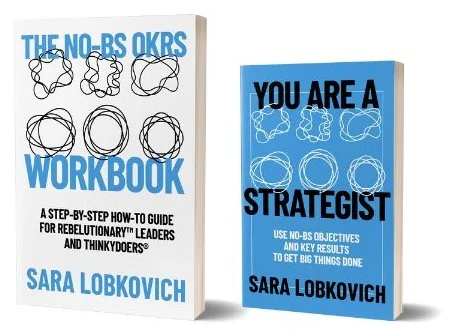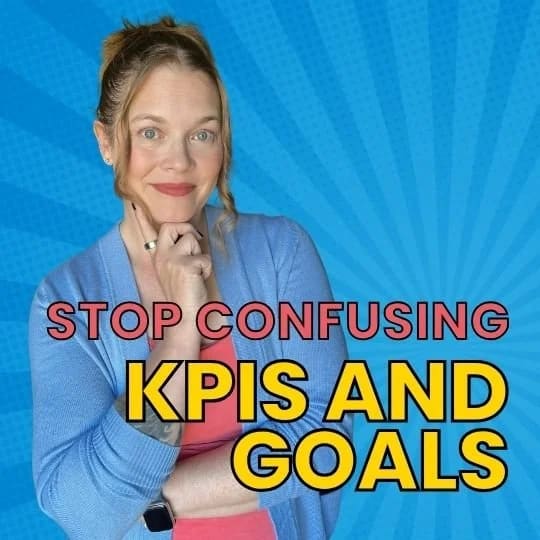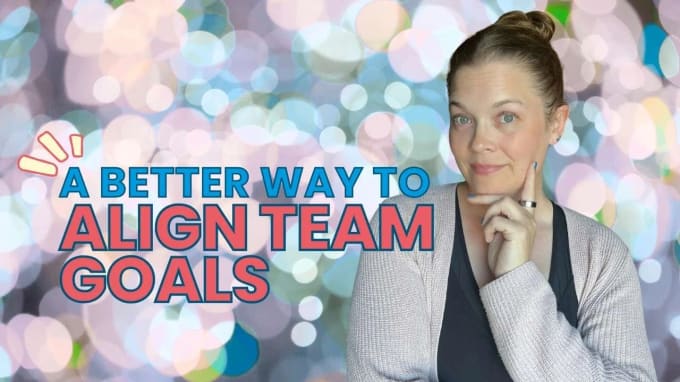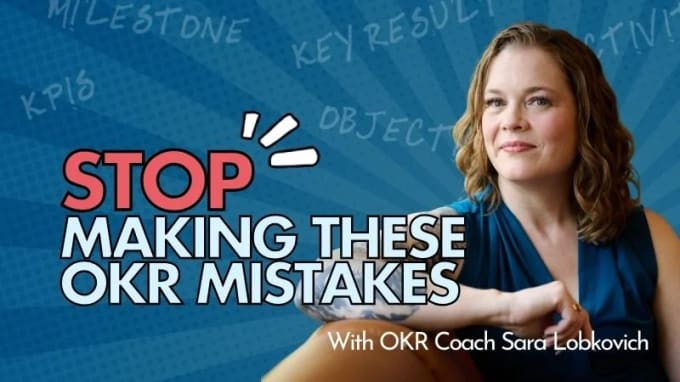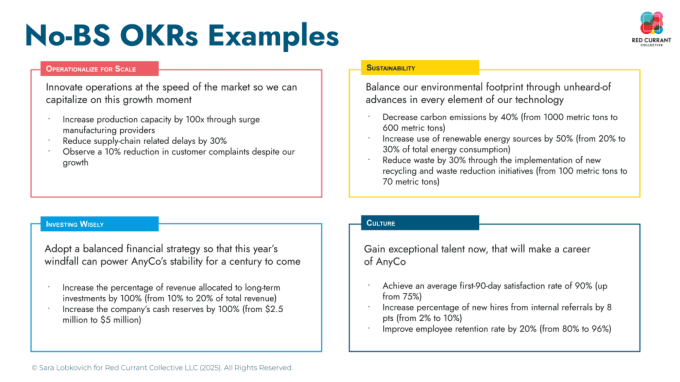Not every organization that’s considering working with OKRs is looking for the type of significant transformation, innovation, and exponential growth that No-BS OKRs are designed to achieve — and even fewer have the appetite for the type of change management, culture, mindset, and behavior change that implementing No-BS OKRs call on us to do.
There are many, many organizations that just need some fundamentals:
-
Increased clarity about what’s important
-
A means of keeping priorities clear and coherent
-
Clearer expectations about what’s expected from whom, when
No-BS OKRs are simple but require rigor: there are new words to learn, new ways of thinking and behaving to develop; and there are tons of organizations where the culture or operating conditions just don’t allow for such change to take hold or be successful.
And there is nothing wrong with that.
Here’s a resource for the rest of OKR implementations, which I call “Relaxed OKRs.” Other people sometimes call them “Traditional OKRs,” (and you’ll even see that term in my book) but the approach I’m sharing here is adapted from other traditional approaches to OKRs with my own little spin on it based on my experience implementing OKRs according to traditional models before creating No-BS OKRs. I’ve also seen these relaxed approaches work with my own earlier clients before I screened carefully for No-BS compatibility, who came to work with me and either I or they realized at some point during our work together that a No-BS OKR approach was not the right tool for the job in their organization.
Even a “Relaxed” OKR implementation can significantly improve clarity, focus, and alignment — especially in an organization that doesn’t have any kind of shared goal or prioritization model today; and, in organizations that have a long-term strategy but no near-term clarity (or, who have no strategy at all).
If you’re considering a Relaxed OKR implementation, the big opportunity I see is to get clear about:
✅ Your objectives: What’s most important to focus on now?
✅ Your “key results” in the form of milestones and/or SMART goals:
📆 Milestones: What has to get done by when?
🥇 SMART goals:* What activities need to be done, how many times, to be considered a success?
And the biggest opportunity is to do that with extreme focus. No endless lists of objectives and “key results.” Aim for a manageable number of topline objectives and 2-4 milestones or SMART goals each, and you’ll yield a great deal more clarity and alignment than doing none of the above, and that’s a great step toward higher performance.
In the No-BS OKRs model, milestones and SMART goals are considered plans , not key results.
No-BS key results are empirically-measurable progress and outcome goals — not activity-based goals. They take a deliberate mindset shift to develop, and in most organizations, are a substantial culture change that requires a focus on psychological safety, trust, and transparency to implement.
Development of No-BS key results simply isn’t right for all organizations, and that’s okay!
The rigor of a No-BS OKR implementation may not be necessary unless your organization needs to pursue more than incremental growth, transformation, or innovation.
Supplemental Resources:
If you need help with your OKR implementation and are not yet ready for No-BS OKRs, check out these other reputable resources:
📚Measure What Matters, by John Doerr, one of the most well-known books about OKRs (which includes milestone-based and SMART goals in its key result model). More info: [via Amazon]
🤝 OKRs.com**** is owned by Ben LaMorte, one of the most experienced practitioners in the OKR space and the author of both “Objectives and Key Results” [Amazon link] with co-author Paul Nivens, and “The OKRs Field Book,” [Amazon link] an outstanding guide to OKR coaching. OKRs.com provides comprehensive OKR training and certification programs and OKR coaching (delivered by some of my close OKR besties) and is a highly trusted referral.
✅OKR Mentors is a network of OKR coaches and experts operating globally, who provides training and coaching support for organizations implementing traditional OKRs.
📈 WhatMatters.com, operated by John Doerr’s team, provides OKR training and resources aligned with the Measure What Matters approach to OKRs.
I hope this is helpful, and best of luck on your OKR journey. Come back anytime if you have questions, or would like more information about No-BS OKRs!
.jpg)
